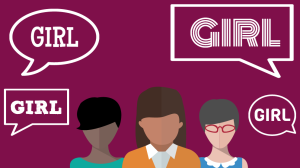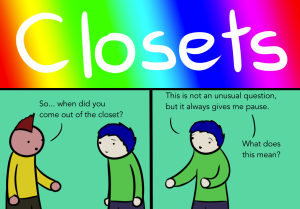This past weekend, I stopped at the convenience store to grab some snacks junk food. The plan was to return home and begin writing this piece for you all, the Everyday Feminism audience.
But what happened next served as an (unfortunate) all-too-real reminder of why I was writing this piece in the first place.
A man approached me and attempted to strike up a conversation. I politely declined and tried to walk away.
He asked if I was married – because apparently I’m only “off limits” if I “belong” to another male. I said, “Yes, I am.” He apologized and said he didn’t know.
Then he walked over to his friend and said, loudly, “I didn’t know! She has that look I like, man,” like I’m a goddamn pair of shoes and he’s window shopping, like I’m not even standing there.
But that’s not the end of it. He comes back because he “just needs to tell me how beautiful I am.” I reply, “That’s nice.”
Then he asks if I’ll take his number down. I say no. He says, “What, you can’t have friends? Your man is one of those controlling guys? Why can’t we talk?” I tell him that I don’t “talk” to random men that approach me in stores.
So then he starts getting all guilt trippy, manipulative, and apologetic. He starts saying, “Aw, I’m sorry. I just don’t know how to talk to pretty girls. I’m not good at it. I have no game.”
So I turn to him and say, “Well, the first thing you do is, when a girl tells you to stop talking to her, don’t keep going.”
He gets all upset and tells me that he did stop. At that point, some people, including his friend and the cashier, ask him to leave and escort him outside.
I had to have the cashier walk me to my car because I was terrified that he would be waiting outside for me.
This experience is a good example of what it’s like for me to move through the world as a sexualized body (thanks to the male gaze), as an object (hello, objectification), and as someone that men feel entitled to (male entitlement, anyone?).
And this experience is not unique to me. Anyone that occupies a marginalized body experiences street harassment on a regular basis.
I spent the rest of the night vacillating between feelings of anger, feelings of shame, and blaming myself for having gone out in public looking and feeling good about myself.
These reactions to street harassment are common, and finding ways to care for yourself in a world that is constantly beating you down is essential for survival. Particularly when you experience harassment on a regular basis, the cumulative effect of those incidents can wear on you.
Learning how to care for yourself in the face of public violence can add another resiliency tool to your toolkit and help make navigating the world just a little less draining.
How Does Street Harassment Affect People Who Experience It?
Several years ago, I decided to keep a street harassment diary to document all of the harassment that I experienced on a weekly basis. At the time, I observed this:
Worse than receiving actual harassment is the near-constant feeling of anticipation or expectation of harassment. It’s this feeling of being on guard at all times. This culture of fear has been created for me, and it makes me feel unsafe in my surroundings even when I’m not actively being harassed or bothered. I notice that I avoid eye contact with men when I am in public. I walk past groups of men with my eyes glued to the ground, hoping that if I don’t look up they won’t speak to me. I turn the volume up on my headphones, hoping to drown out any stray comments or whistles that may come my way. I’m alert and always aware of the person that’s approaching me or sitting next to me. I would consider this behavior paranoid, except that it’s continually proven to me that I have reason to be worried about being harassed.”
What I didn’t know then, but I know now, is that this shouldn’t have been surprising to me. The anecdotal evidence from people who deal with street harassment tells us that it is a traumatic experience.
Trudy, of Gradient Lair, has documented her experience of coping with the trauma of street harassment as a Black woman extensively. She writes that “it has impacted me in the way that Post Traumatic Stress Disorder impacts people who experience other traumas or abuse.”
The way that Trudy describes her reaction to being in public space sounds a lot like the anecdote that I shared above. However, it’s important to note that our experiences differ. As a Black woman, she is visibly marginalized on multiple axes, experiencing misogynoir while in public space, which is something that I am not affected by.
Of course, cisgender women are not the only people that experience street harassment. Trans and gender non-conforming people, queer folks, people of color, and disabled folks are all impacted by it, too.
The more intersections of marginalized identities that a person carries into the world, the more street harassment they are likely to experience. Trans women of color experience the highest rates of such harassment and violence.
For a long time, we could only rely on the stories of people who are targets of harassment to validate these reactions.
Now, there’s research that backs this up. A recent study published in the journal Sex Roles found that “the rampant sexual objectification of women, an act of sexual terrorism, can heighten women’s fears of incurring physical and sexual harm.”
This study also backed up other data that Black feminists have been reporting for a long time when it found that “African American women reported more sexual objectification experiences and fear of crime than white women, and were affected by greater links to psychological distress.”
Essentially, what this means – besides that we should believe marginalized people when they share their lived experiences as anecdotal evidence – is that moving through the world in a body sexualized by the male gaze causes psychological distress.
This psychological distress includes avoidance of certain places or routes, decreased mobility, feelings of anxiety, heightened startle response, hyperarousal, nightmares, intrusive thoughts, or feelings of guilt or shame. These are all symptoms of post-traumatic stress disorder (PTSD).
PTSD develops after an incident that involves physical harm or the threat of physical harm. Therefore, experiencing street harassment on a regular basis has a similar effect on marginalized people as combat does for soldiers. This is partly why street harassment isn’t “just a compliment,” but is, in fact, a very big deal.
And since the oppressive, patriarchal world that we live in is not likely to change overnight, the question becomes how we can take care of ourselves the best way that we can so that we not only survive, but maybe even thrive, in a world that sees to destroy us.
I see practicing self-care in the face of street harassment as a way of taking back my power from my harasser and being defiant and resilient. Self-care can happen at each stage of the process of experiencing harassment and sexual violence.
The first piece of self-care happens during (or immediately following) the incident of street harassment. The next, after the fact, when you’re in a safe place and have the time to properly decompress. And finally, practicing self-care for long-term survival in an oppressive world can help dampen the cumulative effects of the trauma.
How to Practice Self-Care in a Moment of Harassment
When you’re actively experiencing an incident of street harassment, taking care of yourself is probably the last thing on your mind, unless by “taking care of yourself,” I mean “getting the hell out of the situation” (which I do! That’s self-care, too!).
For me, I’m much more likely to experience racing thoughts like, Oh god, I hope this dude isn’t going to talk to me. Oh, he is. Shit. How can I make him go away? Ugh, make it stop make it stop makeitstop.
Sometimes I shut down completely and just kind of nod and smile and be as compliant as possible and hope it stops soon (well, if that didn’t sound like I was describing a rape, I don’t know what does. Street harassment is sexual violence, after all).
But finding ways to cope while the harassment is happening can help your anxiety from escalating and may make you feel better in the aftermath.
1. Try to Relax
When someone is harassing you and your adrenaline is surging, relaxing probably feels like the last thing you should do. But that’s exactly why you should try.
Focus on your breathing, taking deep breaths, concentrating on the inhale and exhale. Try counting to three, four, or five on the inhale and the same number on the exhale. If deep breaths are hard for you to take, simply focusing on the breaths you take is enough.
Listen to calming music or download a guided meditation on your phone that you can turn on in a moment of stress. My favorite? The “F*ck That” meditation (it’s actually incredibly calming!). Try drinking water to stay hydrated, which can help you feel calmer.
These techniques can help you manage your adrenaline response. When you can control your body’s natural adrenaline response to stress, you will feel more physically calm, too.
2. Use Grounding Techniques
“Grounding” is a technique to help you stay present. It’s useful if you’re experiencing a trauma reaction to a situation and need to manage your intense feelings of anxiety.
Some grounding techniques that can be helpful in a moment of harassment may be repeating a mantra to yourself, like “I am okay” or “I am safe.”
You might carry an item with you that makes you feel emotionally safe and pull it out when you’re feeling triggered. I carry fun-sized pots of Play-Doh in my purse because the smell reminds me of childhood and happiness. Other people carry lavender essential oil with them because of the calming aromatherapeutic properties.
Another grounding technique that can be helpful is physically grounding yourself by feeling the hard seat under your butt, digging your feet into the grass, or touching the railing in the stairwell.
3. Practice Awareness
Being aware of your surroundings is similar to grounding. You may feel more prepared and in control if you have a detailed sense of your surroundings.
Engage each of your senses by naming one thing you can see, one thing you can feel, one thing you can taste, one thing you can hear, and one thing you can smell at any moment.
Look around you and take in the details of the place you are in. Name the day, the month, and the year.
But once the moment passes, you might find that you need more decompression.
How to Practice Self-Care After an Incident of Harassment
Once you’ve made it through the incident of harassment itself, you deserve to have a longer, more involved method of self-care to let go of the gross feelings that can follow you after you’ve been harassed.
When you’re in a place you feel safe, consider some of the following ways of taking care of yourself:
1. Seek Support
Receiving support from friends or loved ones who will believe and validate your experience is essential.
If it feels helpful, call a friend and vent about what happened to you. When you get home, talk to your partner(s) or roommate(s) about how you’re feeling.
Hang out with a buddy who makes you laugh and go get coffee or watch a movie together.
If it feels safe and supportive, consider using your social media outlets to share your experience and find solidarity in the fact that you are not alone.
2. Connect with Your Body
Connecting with your body may involve physical activity, but it doesn’t have to. Finding a way to connect with your body that meets your own abilities is crucial. It can help you feel like your body is yours.
If you’re able, attend a yoga class, go to the gym, or head out for a run to burn off some of the excess energy from your adrenaline spike. If that’s not an option for you, scream into a pillow, or punch or throw a pillow across the room.
Give yourself an orgasm, whether you’re alone or with a partner(s).
Wear something that makes you feel good, even if you’re not leaving the house. It can be anything, with the goal being that, in that moment and in that outfit, you actually feel good about being in your body. It might be something fancy, but it also might be something comfortable.
There’s a sense of physical comfort that comes with a pair of sweats that can be incredibly welcome after an experience that made you feel physically uncomfortable.
3. Give Yourself Space
Finding the time to decompress by yourself is really important. It can help you process what happened and recharge yourself.
Take a bath or a shower. I like to do this while I imagine the water physically washing away the residual shame and feelings of ick from the harassment. It feels like a clean, fresh start.
Take a nap. It can be a temporary escape, and your brain actually processes trauma while you sleep, so it’s actually an effective coping mechanism.
Read an engrossing book or write in your journal. Zone out with Netflix. Write yourself a love letter, dance to your favorite music, or eat your favorite food.
How to Cope with Street Harassment on a Long-Term Basis
Over time, repeated activations of the body’s stress response can negatively impact a person’s physical and mental health. What can you do to take the best care of yourself that you can, when you can’t avoid the constant stressor of street harassment?
Building in a regular self-care routine can be a really helpful way to consistently decompress and recharge from the trauma of navigating the world in a marginalized body.
1. Find Healthy Outlets
What can you do on a regular basis to let out your feelings? Drinking and using drugs might be one coping option, but it may not be one that’s good for long-term, healthy use.
Practicing yoga can be incredibly helpful for letting go of the trauma that you hold in your body. There are even trauma-informed classes offered at some studios.
A regular meditation practice is another great option. A friend of mine plays roller derby for this very reason.
Me? I write (and write and write).
2. Consider Seeing a Counselor
Therapy isn’t for everyone, and that’s okay. But finding a therapist that you like and feel safe with can help you process the effects that street harassment has on your mental and emotional well-being.
If you’re having PTSD symptoms as a result of the sexual violence you experience, working with a professional can be helpful.
Finding the right provider might take a while. Don’t be afraid to shop around and find someone that you feel comfortable with.
3. Develop a Reliable Support System
Find a community that is unique to you, that understands what it means to carry the identities that you hold. This kind of support and solidarity can mean everything.
When you don’t have to spend the time explaining yourself, when someone else gets it because they’ve been there too, it makes you feel less alone. It validates your very existence.
Finding that support locally can be hard, so try looking for it online if you have to. If you don’t have support from your family of origin, develop a chosen family that provides the unconditional love that you need.
Wherever you find support, it’s important that you don’t feel like you’re going at this alone. That can be isolating and exhausting.
***
After my experience at the convenience store the other night, I tried to do what I would tell a friend to do if they were in the same situation.
I called my partner and vented. I ranted on social media and got into conversations with other people about the way our PTSD impacts how we experience harassment.
And I sat down to write this article.
Because I want you to know that navigating the world in a marginalized body is hard work. The weight of oppression, harassment, and violence can be crushing.
In an ideal world, you wouldn’t have to experience any of these things. You don’t deserve it and neither do I.
But until we live in a world where everyone can safely navigate public space, we need to do the best we can to take care of ourselves and each other.
You deserve love, care, and peace of mind. We all do.
[do_widget id=’text-101′]
Britni de la Cretaz is a Feature Writer for Everyday Feminism. She is a feminist momma, community organizer, freelance writer, and recovered alcoholic living in Boston. She’s a founding member of Safe Hub Collective. Follow her on Twitter at @britnidlc. Read her articles here.
Search our 3000+ articles!
Read our articles about:
Our online racial justice training
Used by hundreds of universities, non-profits, and businesses.
Click to learn more
Most Read Articles
- « Previous
- 1
- …
- 30
- 31
- 32




















